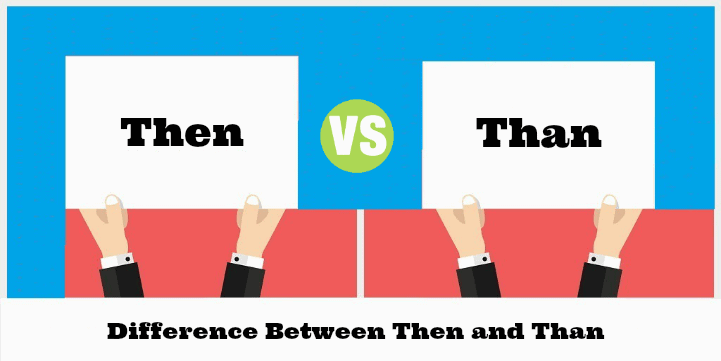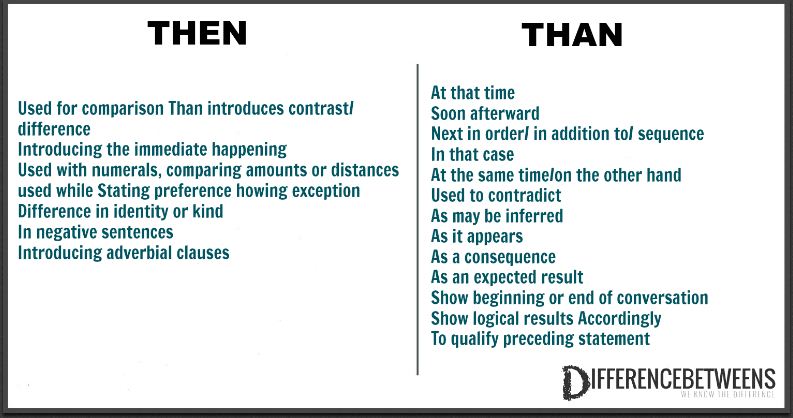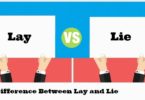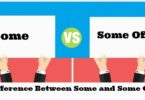What is the Difference Between Then and Than
Summary: Difference Between Then and Than is that The word ‘than’ is employed to indicate comparison and could be a conjunction(A conjunction could be a word that joins 2 sentences). On the opposite hand, the word ‘then’ is employed either to indicate a sequence of events or a way of your time. browse the examples fastidiously to grasp.

THAN
Definitions of than:
- Than is used for comparison after comparative adjective or adverb introducing the second member
- Than introduces contrast/difference
- Than Introduces the immediate happening of things one after another
- Than is used with numerals, comparing amounts or distances
- Than is used while stating preference
- Than is used for showing exception
- Than is used for showing difference in identity or kind
- Than is used for negative sentences
- Than is used for Introducing adverbial clauses
Than Examples
While Introducing Second Element
- Horse can run more quickly than a dog
- 45 is less than 50
- John is better athlete than I
- I am stronger than her
- You are earlier than usual.
Showing Immediate Happening
- I scarcely walked in the door than the commotion started
- Hardly had we arrived than the problem started
- No sooner had I sat down than there was loud knock at the door
- Hardly had the sun come up than the dark clouds began to roll in
Comparing Amounts, Distances and with Numerals
- It takes more than 4 hours to reach hill station
- There are fewer than forty people invited
- It takes less than a mile to river
- He knows more about dramas than I do
- Is Pakistan more democratic state than Bangladesh?
Difference in identity or kind
Adults other than parents
Teachers other than Pakistani
Stating preferences
- Rather than using dry herbs he picked up fresh ones
- She reacted by laughing rather than by quarreling
- She chose to sing rather than dance
- She was sobbing rather than screaming
- Rather than continuing the argument she walked away
Showing Exception
- We are open every day other than Sunday
- Do you have this shirt in any color other than red?
- No one can enter the hall other than by special permission.
Negative Sentences
- I have never known him to behave other than selfishly
- I don’t meet any American other than you
Introducing Adverbial Clauses
- England was more developed than I thought it would be
Dictionary Pronunciation of than
/ðæn/
Origin of Than
Word ‘than’ is known to be used before the 15th century in Bible proverbs.
Etymology
From Middle English than, thanne, from Old English þanne, a variant of þonne, from gem-pro *þana, from earlier *þam, from ine-pro *tóm, accusative masculine of *to-.
Is Than a Preposition or a Conjunction?
According to US and British dictionaries than is accepted both as a preposition and as a conjunction.
When Than Connects Two Phrases or Clauses it is Conjunction
We should not work more than our strength
He is shorter than I am
When the Second Phrase is Elliptical it is used as Conjunction
Harry is taller than I
He is younger than I
Peter is faster than Harry is
When Than is Present with a Pronoun in the Objective Case it is Referred as Preposition
He is shorter than me
John is smarter than me
When used after Hardly or Scarcely is Referred as Preposition
Hardly had the sun come up than the dark clouds began to roll in
Than is also a Preposition when Numerals or Amounts are Compared
It takes more than 2 hours
More than 2000 gathered at park
Than is used as Preposition when followed by an Isolated Pronoun
Her story is different than his
More Examples of Than as a Conjunction
- Sheis more beautiful than I am
- She found his advice more witty than helpful
- We have less work today than we had yesterday
- It’s bigger than I thought it was
More Examples of Than as a Preposition
- Patient survived longer than two years
- Outclassed everyone other than her
- He could run faster than her
Usage of Than according to Dictionary
- Since the 1700s, grammarians have insisted that than should be regarded as a conjunction in all its uses, so that a sentence such as Bill is taller than Tom should be construed as an elliptical version of the sentence Bill is taller than Tom is. According to this view, the case of a pronoun following than is determined by whether the pronoun serves as the subject or object of the verb that is “understood.” Thus, the standard rule requires Pat is taller than I (not me) on the assumption that this sentence is elliptical for Pat is taller than I am. But the rule allows the news surprised Pat more than me, because this sentence is taken as elliptical for the news surprised Pat more than it surprised me. But this analysis is somewhat contrived. Than is quite commonly treated as a preposition when followed by an isolated noun phrase, and it often occurs with a pronoun in the objective case: John is taller than me. In such sentences using the nominative case (than I) can sound unnatural and even pretentious, and objecting to the objective case of the pronoun may sound pedantic. In comparisons using than and as, the second element should be phrased to parallel the first, and faulty parallelism can arise especially when prepositional phrases are involved. In the sentence they felt that the condition of the new buildings was not much better than the old ones, the condition of the new buildings is compared with the old buildings themselves, not with their condition. The pronoun that must be added to balance the noun condition. The noun can be repeated instead, but in either case, the prepositional phrase with of must follow: They felt that the condition of the new buildings was not much better than that (or than the condition) of the old ones. Similar parallelism should follow as: I want the photos in our brochure to look as impressive as those in their brochure (not I want the photos in our brochure to look as impressive as their brochure). Than and as comparisons pose additional problems when the noun following than or as is the subject or object of an implied clause. Does the sentence the employees are more suspicious of the arbitrator than the owner mean that the employees distrust the arbitrator more than they distrust the owner or that the employees distrust the arbitrator more than the owner does? To clarify this, a verb must be added to the second element of the comparison: The employees are more suspicious of the arbitrator than they are of the owner or the employees are more suspicious of the arbitrator than the owner is. (American Heritage® Dictionary of the English Language, Fifth Edition. Copyright © 2016 by Houghton Mifflin Harcourt Publishing Company. Published by Houghton Mifflin Harcourt Publishing Company. All rights reserved).
- In formal English, than is usually regarded as a conjunction governing an unexpressed verb: he does it far better than I (do). The case of any pronoun therefore, depends on whether it is the subject or object of the unexpressed verb: she likes him more than I (like him); she likes him more than (she likes) me. However in ordinary speech and writing than is usually treated as a preposition and is followed by the object form of a pronoun: my brother is younger than me (Collins English Dictionary – Complete and Unabridged, 12th Edition 2014 © Harper Collins Publishers 1991, 1994, 1998, 2000, 2003, 2006, 2007, 2009, 2011, 2014)
- Whether than is to be followed by the objective or subjective case of a pronoun is much discussed in usage guides. When, as a conjunction, than introduces a subordinate clause, the case of any pronouns following than is determined by their function in that clause: He is younger than I am. I like her better than I like him. When than is followed only by a pronoun or pronouns, with no verb expressed, the usual advice for determining the case is to form a clause mentally after than to see whether the pronoun would be a subject or an object. Thus, the sentences He was more upset than I and She gave him more sympathy than I are to be understood, respectively, as He was more upset than I was and She gave him more sympathy than I gave him. This method is generally employed in formal speech and writing. In informal speech and writing than is treated like a preposition and followed by the objective case of the pronoun: He is younger than me. See also but1, different, me. (Random House Kernerman Webster’s College Dictionary, © 2010 K Dictionaries Ltd. Copyright 2005, 1997, 1991 by Random House, Inc. All rights reserved.)
- Grammarians have a number of rules concerning than. In formal grammar, than is not a preposition to govern the oblique case (although it has been used as such by writers such as William Shakespeare, whose 1600 play Julius Caesar contains the line A man no mightier than thyself or me. . . , and Samuel Johnson, who wrote No man had ever more discernment than him, in finding out the ridiculous.). Than functions as both conjunction and preposition; when it is used as a conjunction, it governs the nominative case, and when a preposition, the oblique case. To determine the case of a pronoun following than, a writer can look to implied words and determine how they would relate to the pronoun.
Examples:
- You are a better swimmer than she.
Represents you are a better swimmer than she is.
Therefore you are a better swimmer than her is a solecism.
- They like you more than her.
Represents they like you more than they like her.
Therefore they like you more than she is a solecism,
If it attempts to represent the previous sentence. It may be correct, however, if it represents they like you more than she likes you.
Some grammarians insist that whom must follow than (not who); although according to the above rule, who would be the “correct” form. Critics of this often cite this mandatory exception as evidence that the grammarian rule is logically erroneous, in addition to it being inconsistent with well-established usage.

THEN
Definitions of Then
- Then is used for, at that time
- Then is used for, soon afterward
- Then is used to tell what is, next in order or things in addition to or to tell sequence
- Then is used for, in that case
- Then is used for, at the same time or on the other hand
- Then is used to contradict
- Then is used for, inference
- Then is used for showing how a thing/matter appears
- Then is used, as a consequence
- Then is used for, an expected result
- Then is used to show beginning or end of conversation
- Then is used to show logical results
- Then is used for, accordingly
- Then is used to qualify preceding statement
Than Examples
At that Time
- He was happy then
- Since then I have been working hard
- People then believed in monsters
Soon Afterwards
- He studied and then left
- Turn right then left
- Go to the corner then turn left
Next in Order or in Addition or Sequence
- There are three roses then a tulip
- First came the musicians then the dancers
- Then there is interest to be paid
In that Case
- If it’s not opening then we will have to break the lock
- If it’s noon then it’s time for me to leave
- You don’t like eating chips? What do you want me to cook, then?
At the Same Time or on the Other Hand
- That’s a good book then so is the other one
- That’s a nice route then so is the other one
Used to Contradict
- You are not a good girl, said Eugene to Rapunzel. I am not good, then? Said Rapunzel
- You should go there. I will not, then? Said Eugene
As may be Inferred
- Your mind is made up, then
- You are willing, then
As it Appears
- The cause of plane crash, then, is established
- The killer of the inspector, then, is imprisoned
As a Consequence
- If sides are equal then angles are equals
- If she is intelligent then she will score good marks
As an Expected Result
- If you were in party then you should know me
- If you were in class then you can teach me
Beginning or End of Conversation
- Ok then, I think we have discussed everything
- I have to go, ok, TC, then
Use to show Logical Result
- Why don’t you buy another book? Then you will be able to prepare well
- You haven’t done anything wrong. So, what’s your problem then?
Accordingly
If traffic is heavy then your apology for being late is accepted
To Qualify Preceding Statement
- She was nervous, but then, who is not nervous on the first interview?
Dictionary Pronunciation of Then
/ðen/
Origin of Then
Then is known to be in use before the 14th century as it is clear from many verses of Bible.
Etymology
From Middle English then(ne), than(ne), from Old English þonne, þanne, þænne, from gem-pro *þan-, *þana-, from earlier *þam, from ine-pro *tóm, accusative masculine of *to-.
Usage of “Then” according to Dictionary
- Sticklers for grammar sometimes assert that then is not a coordinating conjunction, and that the sentence She took a slice of pie, then left is thus incorrect; it must be rewritten as She took a slice of pie and then left, in which the then acts as an adverb and the halves of the compound predicate are linked by the coordinating conjunction and. But this use of then as a coordinating conjunction is actually both widespread and widely accepted; in our 2012 survey, more than three-quarters of the Usage Panel found the sentence she took a slice of pie, then left completely acceptable. Note, though, that the punctuation of this conjunctive use of then differs from the usual punctuation for similar sentences using and. No comma is needed when and links the parts of a compound predicate, as in She took a slice of pie and left. When then joins the halves of the predicate, a comma is usually required; only 8% of the Panel approved of She took a slice of pie then left. (American Heritage® Dictionary of the English Language, Fifth Edition. Copyright © 2016 by Houghton Mifflin Harcourt Publishing Company. Published by Houghton Mifflin Harcourt Publishing Company. All rights reserved).
- Then doesn’t meet the full criteria of a coordinating conjunction. Like so and yet, it can be paired with and, but, and or:
-
I walked to the bus stop, but then I decided to take the train.
-
I will study all day, and then I’ll take a nap, or then I’ll take a walk.
-
While then can’t be modified, it can only join specific types of clauses and the order of the clauses can’t be switched, similar to so and for:
-
I will bring a notebook, then a pen. ≠ I will bring a notebook and a pen.
-
I walked to the bus stop, then I decided to take the train. ≠ I decided to take the train, then I walked to the bus stop.
-
The Cambridge Grammar of the English Language identifies so as like a conjunctive adverb, like however, and for as similar to subordinating conjunctions, like because. If I had to categorize then, I’d say it’s more like because and for because the order of the items is generally important.
Is “Then” an Adjective, Adverb, Noun or Co-ordinating Conjunction?
Then can be used as an adjective, adverb, noun and coordinating conjunction. It is adjective when it comes before the noun.
Examples using Then as Coordinating Conjunction
- Add sugar in the pan then add some honey
- I went to school then I went to library
- If you are sick then you must lay down
Examples using Then as a Noun
It is used as noun representing that particular time
- Work will be finished before then
- I waited for him until then
- We are best buddies from then on
Examples using then as an Adjective
It is used as Adjective when it belongs to Specific Prior Time.
- My sister was then about 21 years old
- Harry first refused then he agreed
- You are ill, so you will not be coming to a party, then?
Examples using Then as an Adverb
It is used an adverb showing subsequently or soon afterward.
- Then he used to go out but now he never does
- She couldn’t remember anything that had happened before then
- What happened then?
- Goodbye till then!
Reader’s Pick:
THEN vs THAN
DEFINITION
Used for comparison Than introduces contrast/ difference
Introducing the immediate happening
Used with numerals, comparing amounts or distances
Used while Stating preference
Showing exception
Difference in identity or kind
In negative sentences
Introducing adverbial clauses
DEFINITION
At that time
Soon afterward
Next in order/ in addition to/ sequence
In that case
At the same time/on the other hand
Used to contradict
As may be inferred
As it appears
As a consequence
As an expected result
Show beginning or end of conversation
Show logical results accordingly
To qualify preceding statement
Dictionary Pronunciation
/ðæn/
Dictionary Pronunciation
/ðen/
ORIGIN of THAN
Before 15th Century.
ORIGIN of THEN
Before 14th Century.
ETYMOLOGY
From Middle English than, thane, from Old English panne, a variant of ponne, from gem-pro *pana, from earlier *pam, from ine-pro *tom, accusative masculine of *to-.
ETYMOLOGY
From Middle English then (ne), than (ne), from Old English ponne, panne, paenne, from gem-pro *pan-, *pana-, from earlier *pam, from earlier ine-pro *tom, accusative masculine of *to-.
USAGE of THAN
Used as conjunction and preposition.
USAGE of THEN
Used as coordinating conjunction, adverb, adjective and noun.
USAGE of THAN in SENTENCES
Horse can run more quickly than a dog.
45 is less than 50.
John is better athlete than I.
I am stronger than her.
You are earlier than usual.
I scarcely walked in the door than the commotion started.
USAGE of THEN in SENTENCES
He was happy then.
Since then I have been working hard.
People then believed in monsters.
He studied and then left.
Turn right then left.
Go to the corner then turn left







Leave a Comment
You must be logged in to post a comment.